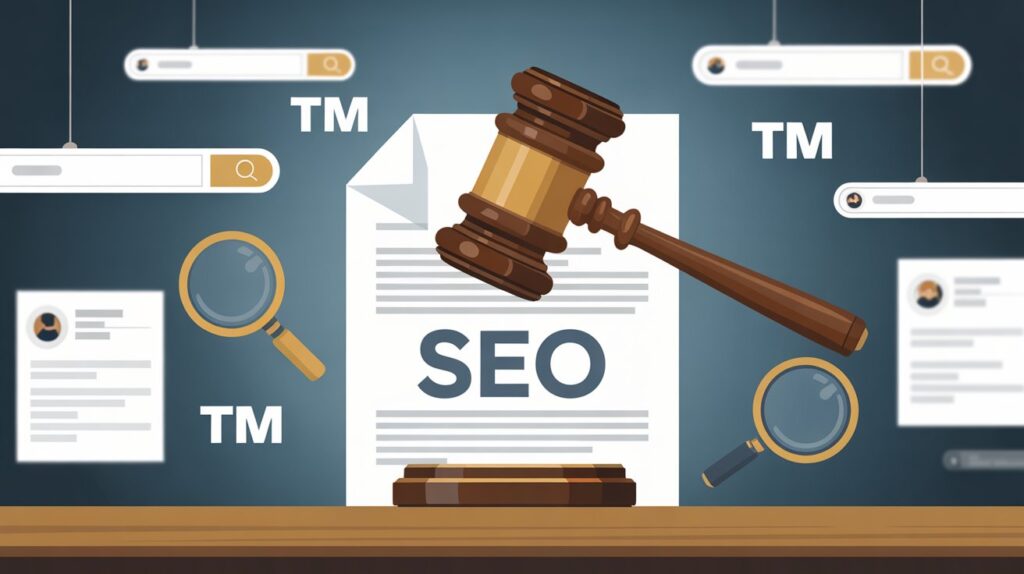If you’ve ever spent time digging into SEO, you’ve probably wondered: Can someone actually own a keyword? After all, businesses fight over them, advertisers bid on them, and entire strategies are built around ranking for specific words and phrases.
It’s a fair question. In a world where even the smallest edge in search visibility can mean thousands of visitors (and dollars), the idea of copyrighting keywords feels almost believable.
But here’s the truth: keywords themselves are not copyrighted. Let’s break it down in plain English, clear the confusion around copyright vs trademarks vs plagiarism, and figure out what really matters for SEO.

Keywords vs Copyright: Clearing the Basics
First, let’s define the players:
- Copyright protects creative works. Think books, blog articles, photos, videos, songs, or artwork. Copyright doesn’t protect short words or phrases.
- Trademarks protect brands. A business can trademark its brand name, slogan, or logo (e.g., “Nike,” “Just Do It”).
- Keywords are simply search terms people type into Google. They’re neither creative works nor brand identifiers by themselves.
👉 Translation: You cannot copyright the keyword “best shoes” because it’s just a phrase. But Nike can trademark the word “Nike” as a brand.
Why Keywords Can’t Be Copyrighted
Copyright law specifically excludes single words, short phrases, names, titles, and slogans from protection. The logic is simple:
- Language belongs to everyone.
- If people could copyright words, communication itself would collapse.
Imagine if one company owned the word “pizza” and another owned “travel.” The internet would break.
So when you optimize your site for terms like “cheap flights” or “best SEO tools,” you’re in the clear. No one owns those keywords, and you’re free to target them.
Where the Confusion Comes From
Even though keywords can’t be copyrighted, there are three areas where people often get confused:
1. Trademarks in Keywords
While “keywords” aren’t protected, brands can stop you from misusing their trademarked terms.
For example:
- You can’t start a shoe brand and call it “Nike Shoes.”
- Running Google Ads using your competitor’s trademark (e.g., “Buy Adidas at half price”) can get you into legal hot water.
But — you can mention competitors in a comparative context, like “How Nike differs from Adidas.” That falls under fair use.
2. Plagiarism vs Copyright in SEO
Some bloggers mistakenly think using the same keywords as another site is plagiarism. Not true.
Plagiarism is about copying creative expression, not single words.
- If you copy someone’s blog post word-for-word → that’s plagiarism and copyright infringement.
- If you use the keyword “SEO tips” in your own unique article → that’s perfectly fine.
3. Google Ads Controversies
A big source of the “keywords are copyrighted” myth comes from PPC advertising. Companies often sue competitors for bidding on their brand keywords.
For example, if Pepsi runs ads targeting the keyword “Coca-Cola,” Coca-Cola may challenge it.
- Google allows bidding on competitor keywords, but doesn’t allow using competitor trademarks in ad copy unless authorized.
- That’s a trademark issue, not copyright.
Real Legal Examples
- Playboy vs. Netscape (1999): Playboy sued because adult sites were using “Playboy” and “Playmate” as trigger keywords for ads. Playboy won, but the ruling was about trademark infringement, not keyword copyright.
- Rosetta Stone vs. Google (2010): Rosetta Stone argued that Google let competitors bid on its trademarked term. Again, it was about trademark use, not copyright.
👉 These cases show that legal battles around keywords are almost always trademark-related, not copyright.
Why This Matters for Bloggers and Marketers
Understanding this distinction saves you from unnecessary fear and helps you focus on what matters:
- You’re free to use common keywords in your content. Nobody owns “SEO tools,” “best smartphones,” or “healthy recipes.”
- Be cautious with brand names. Don’t pass off a competitor’s trademark as your own. Comparisons = fine. Misleading usage = risky.
- Original content wins. Keywords alone don’t rank. Google values how you use them in meaningful, unique content.
The Conspiracy Angle: Why Do Some People Say Keywords Are Protected?
Here’s the kicker: sometimes, agencies or businesses spread the myth that keywords are protected to scare off competitors.
Example: A brand might claim, “Don’t use our phrase, it’s copyrighted.” But legally, unless it’s a trademarked brand slogan, that claim doesn’t hold water.
It’s less about law, more about intimidation. If you hear it, always ask: Is it trademarked, or are they bluffing?
SEO Takeaway: Focus on What You Control
Instead of worrying about copyright battles over keywords (that don’t exist), focus on what does matter:
- Use keywords to guide your content, not define it.
- Write for humans first, search engines second.
- Build topical authority by covering subjects deeply, not just sprinkling keywords.
- Don’t copy content; add your unique perspective.
The more authentic your content, the less you have to worry about copyright, plagiarism, or algorithm shifts.
Final Thoughts
So, are keywords copyrighted? No. Keywords are public language, free for everyone to use.
What you should watch out for are trademarks — using brand names unfairly or misleadingly can lead to legal trouble. But as long as you’re creating original content and using keywords naturally, you’re safe.
The real win in SEO isn’t who “owns” a keyword — it’s who provides the most value when people search for it.
👉 Want to see how well your keywords are balanced in your content? Try our Keyword Density & Word Counter Tool on SEOExprt.com.
For any questions, feel free to reach us.
{ “@context”: “https://schema.org”, “@type”: “FAQPage”, “mainEntity”: [ { “@type”: “Question”, “name”: “Are keywords copyrighted?”, “acceptedAnswer”: { “@type”: “Answer”, “text”: “No, keywords are not copyrighted. Copyright law does not protect single words or short phrases. However, trademarks can protect brand names or slogans.” } }, { “@type”: “Question”, “name”: “Can I use competitor brand names as keywords?”, “acceptedAnswer”: { “@type”: “Answer”, “text”: “You can use competitor brand names for comparisons or reviews under fair use. But using trademarked names misleadingly, especially in ads, can cause legal issues.” } }, { “@type”: “Question”, “name”: “Is using the same keywords as other blogs plagiarism?”, “acceptedAnswer”: { “@type”: “Answer”, “text”: “No, using the same keywords as other blogs is not plagiarism. Plagiarism occurs when you copy creative content, not when you target the same search terms.” } } ] }